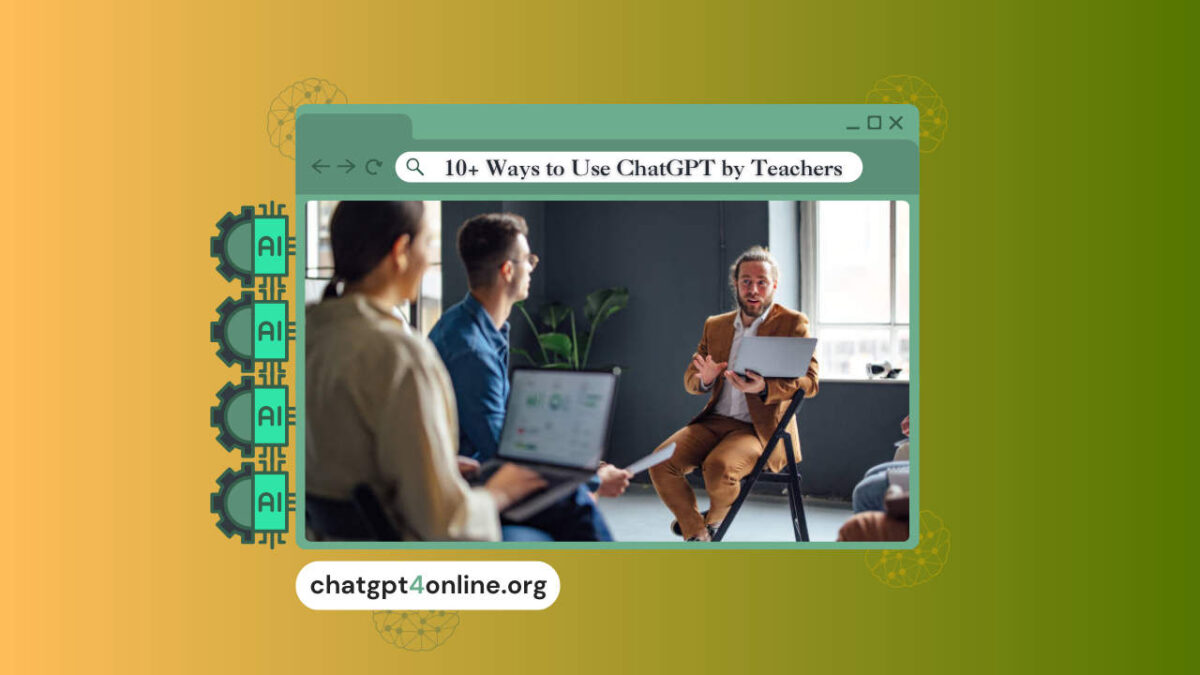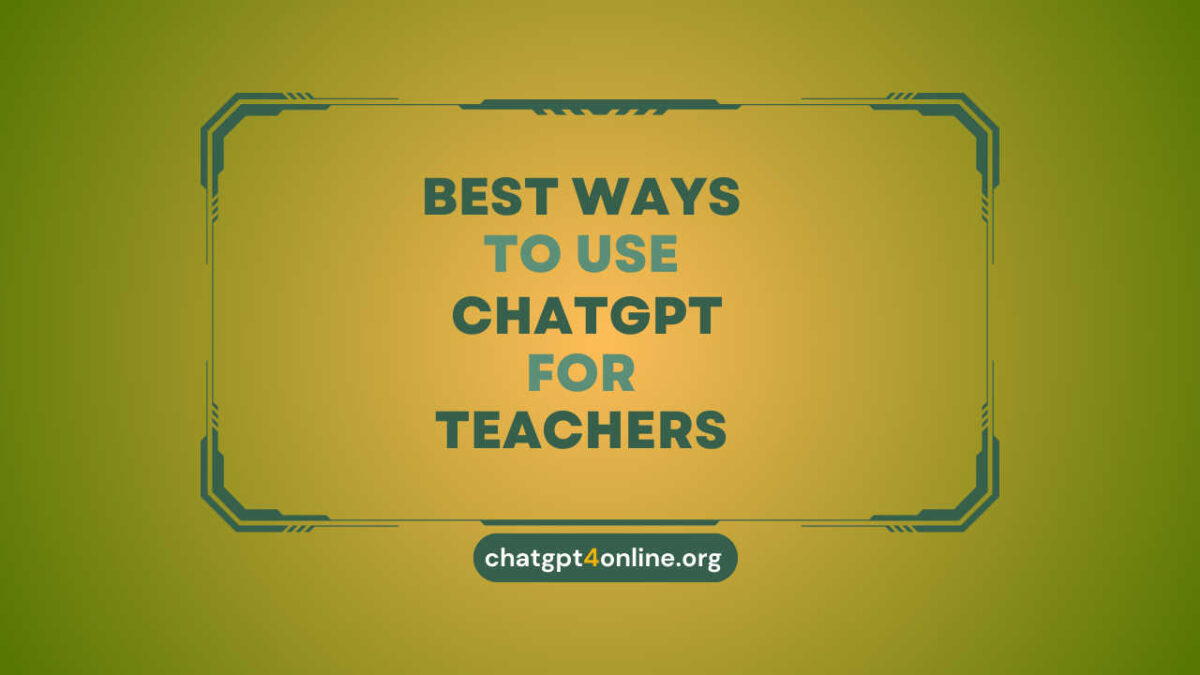ChatGPT For Teachers
In the dynamic landscape of education, teachers and educational institutes are exploring innovative tools to enhance their teaching methodologies and engage students effectively. ChatGPT for teachers is a powerful tool that enhances the academic experience by providing versatile and responsive assistance.
As technology continues to play an increasingly integral role in the classroom, educators and educational businesses are exploring innovative ways to leverage tools like ChatGPT to support their teaching and business objectives.
We’ve quite effective ChatGPT tools for teachers which enhance your productivity and automate your several tasks. These customized tools or custom GPTs are specially designed for teachers.
Our toolkit for ChatGPT for teachers includes the following GPTs.
Quiz Generator
Are you looking for an AI tool to automatically generate quizzes like multiple choice questions, fill in the blanks, and true or false? We get you covered. You can automate all these hectic tasks with our free and custom chat gpt for teachers particularly designed to generate quizzes.
Create Quiz!
Lesson Plan Calendar Generator
Generate a Lesson plan calendar for whichever subject you want to create! The suggested lessons would aim at developing critical thinking, creative thinking, communication skills, analytical skills and research skills.
Generate Lesson Plan Calendar!
How Can Teachers Use ChatGPT?

How can teachers use ChatGPT to maximize its potential in the classroom? Or how can educational businesses/institutes encourage their educators to get the benefits of ChatGPT? One key application is the development of customized educational materials. By entering specific criteria and educational goals, teachers can prompt ChatGPT to generate content tailored to their unique teaching requirements.
This advanced language model has the capacity to assist teachers in various aspects of their profession, from generating engaging lesson plans to offering personalized feedback on student assignments.
Subject Overview Generator
The following ChatGPT for teachers provides an explanation and overview of your provided subject. It assists you with core topics, explanations, class-based activities, and further learning resources related to your subject.
Generate Subject Overview!
Resource Generator (Resources for Presentation)
This AI tool for teachers assists you in finding relevant tools or resources to help you create interactive presentations for your students focusing on your given subject or topic. Great, Isn’t it!
So, what are you waiting for? Give it a try!
Generate Resources!
10+ Ways to Use ChatGPT for Teachers: Most Important Ones
Following are the ways you as a teacher or educator can use ChatGPT as your field-specific AI assistant to its highest effectiveness :

ChatGPT for Effective Lesson Planning
In today’s demanding landscape of teaching, where efficient lesson planning skill is a cornerstone of effective education, ChatGPT emerges as a worthy AI assistant for teachers.
Consider a scenario where a physics teacher is preparing a unit on Newton’s laws of motion. By inserting core concepts, learning objectives, and preferred teaching methods into ChatGPT, the teacher receives plenty of diverse suggestions for crafting engaging lessons.
For instance, the CharGPT can propose a dynamic experiment using everyday objects to illustrate the concept of inertia or suggest incorporating a virtual simulation to demonstrate gravitational forces.
These creative ideas not only save valuable planning time but also inject a sense of innovation into the curriculum, ensuring that students encounter diverse and stimulating learning experiences.
By using ChatGPT for lesson planning, teachers can efficiently navigate the complexities of curriculum development while fostering an environment of dynamic and effective learning.
ChatGPT As A Speedy Search Engine
Teachers often struggle with the constant need for timely and accurate information, and it’s quite normal. ChatGPT, an AI tool, has risen above traditional search engines in terms of answering customized answers to your queries.
For example, a scenario in a science class where a student raises an impromptu question about a recent scientific discovery.
With ChatGPT at their disposal, the teacher can swiftly input the inquiry, and within seconds, the model retrieves relevant articles, summaries, and even visual aids, offering a comprehensive overview of the breakthrough.
This instantaneous access to up-to-date information not only addresses students’ curiosity promptly but also amplifies the teacher’s ability to seamlessly integrate the latest developments into the ongoing lesson.
Improving Classroom Engagement
In today’s world of education and academia, where student engagement is pivotal to effective learning, ChatGPT emerges as an assistant tool for teachers which helps them in fostering interactive and captivating classroom experiences.
Consider a scenario in a high school biology class where the teacher aims to explore the intricacies of ecosystems. By consulting ChatGPT for teachers, the teacher can integrate engaging activities tailored to the specific interests of the students.
For instance, ChatGPT can propose an interactive simulation where students collaborate to design their virtual ecosystems, considering factors like biodiversity, climate, and ecological balance. Additionally, ChatGPT can suggest discussion prompts that relate scientific concepts to current environmental issues, fostering meaningful conversations.
This not only elevates classroom engagement but also enables teachers to align lessons with students’ interests and the ever-evolving trends in science and society.
Q&A Sessions’ Preparation
In the art of teaching, the ability to ignite curiosity and stimulate critical thinking through well-crafted questions is a hallmark of effective educators. You as a teacher can use ChatGPT to help in the preparation of engaging question-and-answer sessions.
For example, in a high school biology class where the teacher is gearing up for a discussion on a complex topic like genetic mutations. Utilizing ChatGPT, the teacher can input key concepts and areas of focus, prompting the model to generate a series of engaging and challenging questions.
These questions are beyond the surface, encouraging students to analyze, synthesize, and apply their knowledge.
Instead of asking a straightforward factual question, ChatGPT for teachers can suggest a query like, “How might a genetic mutation impact an individual’s susceptibility to certain diseases over multiple generations?”
This not only elevates the depth of classroom discussions but also empowers students to explore the subject matter from various angles, fostering a richer understanding.
Making Flash Cards with Q&A
In the pursuit of effective study aids, ChatGPT proves invaluable for teachers seeking to create dynamic and interactive flashcards that enhance students’ retention and understanding.
For instance, a biology teacher covering a unit on cellular biology can use ChatGPT by inserting basic concepts into ChatGPT, and it’ll generate a set of flashcards with questions on one side and detailed answers on the other.
It can pose a question like, “What is the function of the mitochondria?” with the answer providing a concise explanation of its role in energy production.
These flashcards not only serve as a portable and engaging study resource but also cater to diverse learning preferences, reinforcing key information through repetition and active recall.
Obtaining Innovative Examples
In the precise domains of mathematics and science, where conceptual clarity is paramount, ChatGPT emerges as a tool that empowers teachers to transcend conventional teaching methods.
Imagine a physics class delving into the intricacies of quantum mechanics. The teacher, faced with the challenge of simplifying complex concepts, can turn to ChatGPT free online. By inputting key quantum principles, ChatGPT generates innovative and relatable examples that demystify the abstract nature of the topic.
For example, it can illustrate the concept of superposition using a hypothetical scenario involving Schrödinger’s cat, providing a tangible and engaging analogy for students.
This not only enhances comprehension but also sparks curiosity, illustrating that even the most intricate concepts can be made accessible through creative and innovative teaching methods.
Teaching Vocabulary Boost with ChatGPT
Developing a rich and diverse vocabulary is a fundamental goal in a language class. Teachers can use ChatGPT for it also.
If I take the instance English class where the teacher is introducing a unit on Shakespearean sonnets, the teacher can use chatgpt to input key terms like “sonnet,” “quatrain,” or “iambic pentameter,” prompting the model to generate not only definitions but also a plethora of related words and phrases.
For instance, when exploring the term “quaint” in the context of Elizabethan language, ChatGPT might suggest synonyms like “charming,” “picturesque,” and “old-fashioned,” along with antonyms like “modern” or “ordinary.”
Moreover, this tool can provide contextually relevant examples, illustrating how these words can be seamlessly woven into sentences.
This interactive approach transforms traditional vocabulary lessons into dynamic experiences, allowing students not only to grasp definitions but also to appreciate the subtleties and versatility of language.
Developing Engaging Role-Play Scenarios
In the colorful landscape of history or social studies classrooms, where the exploration of bygone eras and societal structures comes to life, ChatGPT for teachers serves as a creative catalyst.
For example, a high school history teacher aims to engage students in the complexities of the Renaissance. By inputting key historical figures, events, and societal dynamics into ChatGPT, the teacher can seamlessly generate immersive role-play scenarios.
ChatGPT can propose a scenario where students embody influential figures like Leonardo da Vinci or Machiavelli, engaging in a spirited debate on the societal advancements of the time.
This not only transforms historical learning into an interactive experience but also encourages students to comprehend the nuances of different perspectives. ChatGPT’s contribution extends beyond factual recall, it enables teachers to infuse creativity into the curriculum.
Check Also: ChatGPT Custom Instructions: Now for ChatGPT’s Free Users
Remain Aware of New Slang
In the ever-evolving domain of language and communication, ChatGPT has become a highly significant resource for educators aiming to stay abreast of new slang and contemporary language trends.
For instance, a teacher who seeks to connect with students through relevant and current language usage can use a chatbot to learn modern slang and the latest linguistic nuances.
ChatGPT can offer explanations for popular acronyms, expressions, or idioms commonly used by students.
This not only helps to create a connection between educators and students but also ensures that classroom interactions remain culturally relevant and engaging.
Preparing Math Problems
ChatGPT can work as a versatile ally for mathematics educators. Consider a high school algebra class where the teacher aims to provide a range of challenges to accommodate varying proficiency levels.
With ChatGPT, the teacher can input specific mathematical concepts, and ChatGPT will generate an array of problems that span from basic to advanced.
For example, it can generate algebraic equations with varying complexities, ensuring that students can choose problems that align with their current skill levels.
This not only diversifies the learning experience but also allows teachers to tailor assessments that challenge and stimulate each student appropriately, fostering a more inclusive and dynamic mathematics curriculum.
Get Review Questions to Assess Understanding
In the pursuit of assessing students’ comprehension and reinforcing subject-specific concepts, ChatGPT for teachers becomes a valuable resource for educators seeking diverse and effective review questions.
For instance, a teacher can prepare a review session for an upcoming exam on the solar system by entering specific topics and learning objectives into ChatGPT. The AI tool will create a set of comprehensive review questions that cover various aspects of the subject.
ChatGPT can pose questions ranging from identifying planetary characteristics to explaining the causes of celestial phenomena.
These review questions not only serve as a robust tool for gauging students’ understanding but also facilitate targeted revision, ensuring that key concepts are solidified before assessments.
Craft Customized Recommendation Letters
In terms of supporting students’ academic journeys, ChatGPT becomes a valuable aid for educators tasked with crafting personalized and impactful recommendation letters.
A teacher with the help of this AI chatbot can write a recommendation letter for a student applying to college. He/She just needs to input relevant details about the student’s achievements, character, and aspirations into ChatGPT, it’ll generate a draft that captures the student’s unique qualities.
For example, it can highlight the student’s leadership in extracurricular activities, academic excellence, and notable contributions to the school community.
This not only streamlines the recommendation letter writing process but also ensures that each letter is tailored to reflect the individual strengths and qualities of the student.
You can also explore how you can use ChatGPT for Interview Preparation.
Find Suggestions to Support Struggling Students
ChatGPT serves as a valuable resource for teachers seeking tailored strategies to assist struggling students.
For instance, a math teacher who confronts a student struggling with algebraic concepts can use ChatGPT by entering specific challenges faced by the student into it.
By using this AI chatbot, teachers can get personalized suggestions, ranging from alternative teaching methods to supplementary resources.
ChatGPT for teachers can recommend interactive online tutorials, targeted practice exercises, or even peer-assisted learning opportunities.
Generating Tailored Notes to Parents
To have effective communication between educators and parents, ChatGPT for teachers serves as a valuable tool for producing informative and empathetic notes.
A teacher who needs to update parents on their child’s progress and achievements can get help from ChatGPT. Given certain details by the teacher, this AI tool can generate personalized notes that convey both positive highlights and areas for improvement.
For example, it can compose a note expressing appreciation for a student’s active participation in class discussions while gently addressing the need for additional focus on homework completion.
These notes not only foster a collaborative relationship between teachers and parents but also contribute to a supportive and informed network dedicated to the student’s academic success.
Final Thoughts
ChatGPT holds immense potential for revolutionizing the teaching landscape. By integrating our powerful toolkit for teachers into their repertoire, teachers can not only streamline administrative and teaching tasks but also elevate the overall educational experience for their students.
The adaptability of ChatGPT for teachers and educational businesses makes it a valuable ally for educators striving to create a dynamic and engaging learning environment.
This AI development serves as a multipurpose asset for teachers and educational businesses, offering many features tailored to the unique needs of the teaching environment. Therefore, teachers and educational institutes must utilize it.
Albert Haley
Albert Haley, the enthusiastic author and visionary behind ChatGPT 4 Online, is deeply fueled by his love for everything related to artificial intelligence (AI). Possessing a unique talent for simplifying complex AI concepts, he is devoted to helping readers of varying expertise levels, whether newcomers or seasoned professionals, in navigating the fascinating realm of AI. Albert ensures that readers consistently have access to the latest and most pertinent AI updates, tools, and valuable insights. Author Bio


